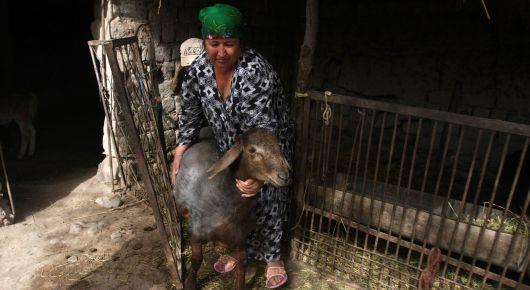Project kicks off for efficient and sustainable small ruminant production

A regional virtual workshop marked the launch of an FAO project that aims to increase the effectiveness of small ruminant production and reduce greenhouse gas emission intensity. Funded by Turkey, the project is designed to increase knowledge on efficient small ruminant production systems in Azerbaijan, Kazakhstan, Kyrgyzstan, Tajikistan, Turkey, Turkmenistan and Uzbekistan.
The project will last until the end of 2024 and contributes to the achievement of several Sustainable Development Goals (SDGs), including SDG 1 (No Poverty), SDG 2 (Zero Hunger), SDG 13 (Climate Action) and SDG 15 (Life on Land).
The workshop was opened by Eran Raizman, Senior Animal Health and Production Officer and Lead Technical Officer of the project and Burhan Demirok, Deputy Director-General for Livestock at the Ministry of Agriculture and Forestry of the Republic of Turkey. Highlighting the particular importance of small ruminant production for developing countries, Raizman noted that the project addresses multiple constraints that affect sustainable production of small ruminants. Demirok emphasized that the project will contribute to the sustainability of small ruminant production in the sub-region through the provision of technical support and expertise to farmers in the beneficiary countries. Demirok also pointed out that the project will empower women in rural areas.
Following these opening remarks, Eran Raizman introduced the project and explained its purpose to the participants. He elaborated on bottlenecks that impact small ruminant production, such as obsolete husbandry, feeding and breeding practices, animal diseases and limited grazing resources. He also cited specific FAO approaches that help overcome these issues, such as Farmer Field Schools and technology transfer. Yuriy Nesterov, Livestock and Animal Health Specialist at FAO, reflected on current practices in the beneficiary countries regarding small ruminant production and set out the expected contributions of the project.
Workshop participants also had the opportunity to learn about the current status of small ruminant production and related activities in the seven beneficiary countries. Afterwards, a discussion session focused on best practices relevant to the project goals in the beneficiary countries and knowledge transfer to smallholders farmers.
Field activities focusing on small ruminants will begin soon with training of female members of a livestock cooperative in Balıkesir province.
7 June 2021, Ankara, Turkey
